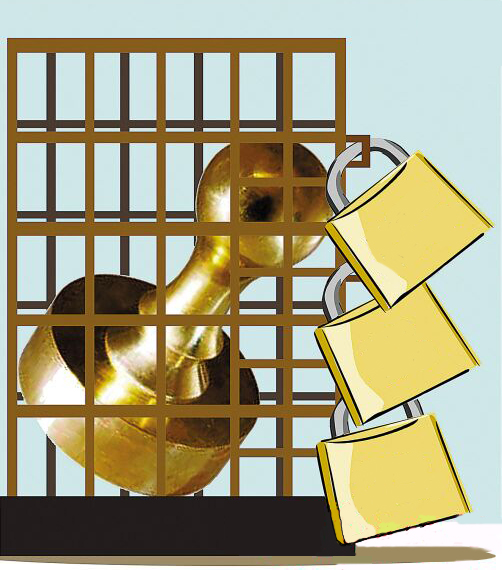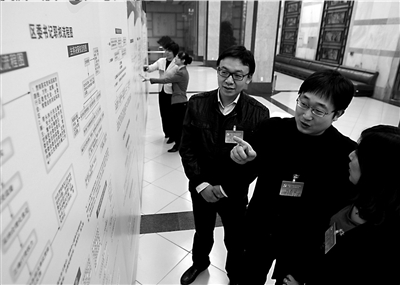Restricting power strengthens rule of law

A stamp symbolizes power in China. The purpose of law-based governance is to regulate government powers and put them into the cage of “rule of law.”

Beijing announces the “power lists” of district-level leading cadres for the first time.
The Communist Party of China (CPC) Central Committee’s decision (hereafter referred to as “the Decision”) on major issues concerning comprehensively advancing the rule of law, which was passed at the fourth plenary session of the 18th CPC Central Committee in October 2014, introduced a list of government powers to “resolutely squeeze out the room for power rent-seeking,” or using power to influence regulations and gain business advantages. The move aimed to strengthen law-based government and promote the rule of law.
The purpose of law-based governance is to regulate government powers and curb them through “rule of law;” in other words, to comprehensively perform government functions in accordance with the law.
The Decision specifies the basic criteria for rule-of-law governance including well-defined functions and duties, legally defined powers and responsibilities, strict law enforcement, openness and impartiality, clean and efficient government, and law adherence and credibility.
CPC leadership under rule of law
The tripartite collaboration among the ruling party, the government and the rule of law is core to building a law-abiding China.
Adhering to the leadership by the CPC is the first principle of comprehensively advancing the rule of law and fostering a law-based government. “The leadership of the CPC aligns with the socialist rule of law, because the latter entails adherence to the Party leadership and adherence to the Party leadership must rest on the socialist rule of law,” the Decision stated.
The leadership of the CPC over the law-based government is beyond all doubt. However, while constantly cementing its political leading position and improving its functions, the CPC should also strive to transform itself into a “service-oriented” ruling party as required by the times.
First, the Party’s leadership doesn’t place the CPC above the law. Instead, as the leader and organizer, the CPC must act within the scope of the Constitution and law and strictly abide by both in its governance. Accordingly, Party members must comply with state laws and regulations.
Governments at all levels must change their style of leadership, upgrade their levels of scientific, democratic and rule-of-law administration, and institutionalize governance of social affairs by clear standards and through defined procedures.
Second, the Party’s leadership doesn’t allow the CPC to go beyond its duties and meddle in government work. Exercising leadership over the government, it must assume overall responsibility for government work through guidelines, lines, principles and policies to ensure the opinion of the Party is translated into the will of the state through legal procedures and government organs at various levels; the Party must lead the country and society through down-to-earth work.
Third, the Party’s leadership doesn’t allow policies formulated by it to take the place of state laws. Both mirroring the will of the people, Party policies and state laws are consistent in nature. Therefore, it is a must to give full play to advantages of both to enhance interaction between the two.
Fourth, the Party’s leadership is the most fundamental guarantee of comprehensively advancing the rule of law and accelerating the building of a socialist rule-of-law country. Legal systems constitute a part of state institutions. Formulated and approved by the state, they have secured the coercive force of the state and reflect the common will of the general public.
Party laws and regulations are developed by the CPC, reflecting the will of the Party and guaranteed by the Party Constitution and disciplines. In this sense, the Party Constitution shores up law-based governance, so Party rules are necessary to oversee Party members and cadres to make sure that they observe state laws and regulations.
Clarifying statutory powers
Having a law-based government is a common wish of the people. The CPC has been working hard to exercise government administration in accordance with the law. However, methods of exercising power vary due to vaguely defined power boundaries. Furthermore, there are still people making unspoken rules, taking their own words as the law, placing their own authority above the law or abusing the law.
Some extreme cases not only severely damage social fairness and justice while undermining the administrative basis of the government, but even cause group incidents of different scales, directly threatening social security and stability. Clearly stipulating power boundaries in the form of power lists provide an efficient way to reduce the overstepping of powers by setting standards to resist, restrict, supervise, prosecute and punish such behaviors, maintaining the authority of laws and regulations.
As a law-based authorization mechanism, power lists specifically stipulate the processing of government affairs, relevant legal basis, evidence materials needed to be submitted, the rights and obligations of a post as well as rewards and punishment measures. This is doubtlessly a revolution of the internal management of the Chinese government, and dramatic progress will be made in the working style of public officials and the government’s working efficiency. The purpose of the power list system is to comprehensively sort out functions and powers of government bodies, actively streamline the administration and delegate more power to lower-level governments. From top to bottom, the government can achieve “clarification of powers, reduction of powers and oversight of powers,” according to the Decision.
“Clarification of powers” refers to comprehensively sorting out the powers of office. The government departments shall, according to laws, regulations, rules and “three defining” (defining the organization, defining the functions and defining the size of government bodies), comprehensively sort out the main duties and responsibilities of internal departments, refine each responsibility further into specific functions and powers, and register the department powers item by item in accordance with the administrative power classification standards.
“Reducing powers” refers to actively streamlining the administration and delegating more power to lower-level governments. According to the sorting of the administrative powers, the government shall conduct scientific evaluation on the legal basis of each power, its exercising procedures, operation performance and integration of responsibility and powers. It shall also propose specific opinions on sorting out the functions and powers in accordance with the requirements of statutory powers, streamlining the administration and delegating powers, and government function transformation. This process includes determining which powers can be canceled, which can be delegated to lower levels, which can be handed over to the public institutions and which can be transferred to social organizations.
“Oversight of powers” refers to releasing power lists. With regard to the remaining matters that require administrative approval, we should establish power lists according to specified formats and map out the operation of powers, establish and improve oversight of delegated matters when and after they are handled, release information of departments that exercise administrative powers to the public, including the name and number of the power, its exercising ground, and release the operation process according to the law. It is also necessary to establish a dynamic adjustment mechanism for power lists and operation processes, make regular revisions and improvements, and release results in accordance with procedures.
Li Hezhong is a professor from the School of Political Science and Public Administration at Wuhan University.
